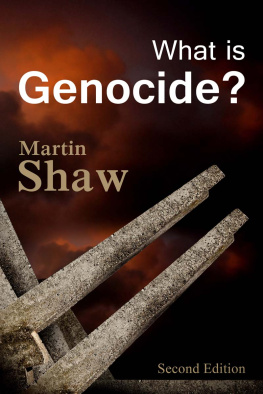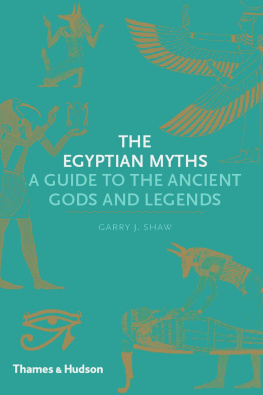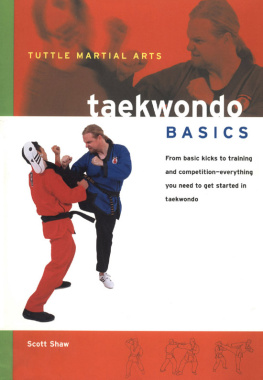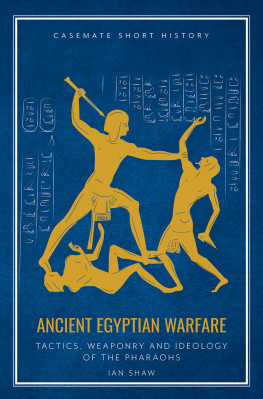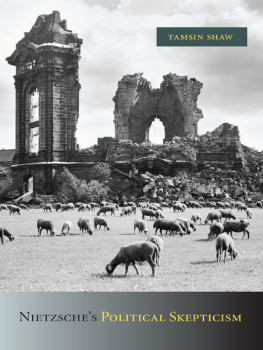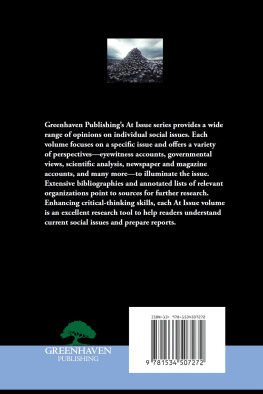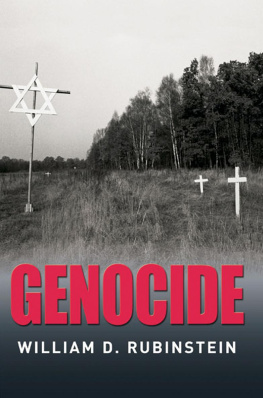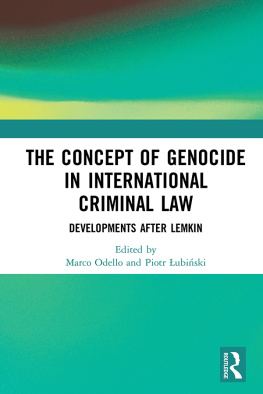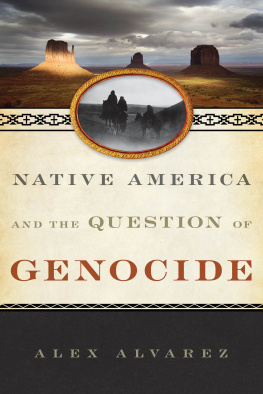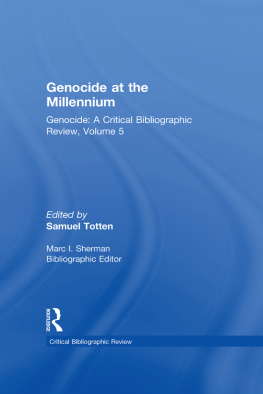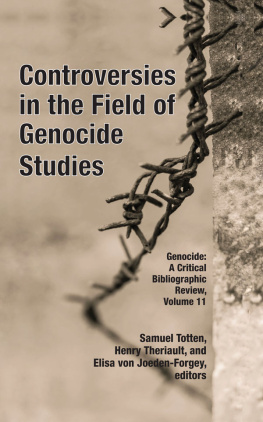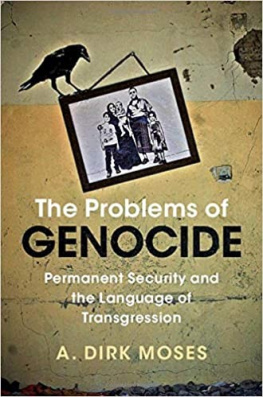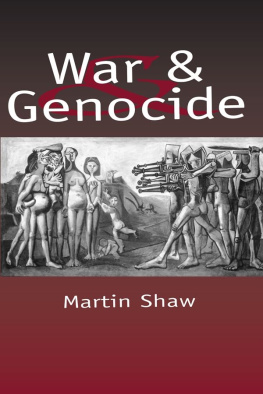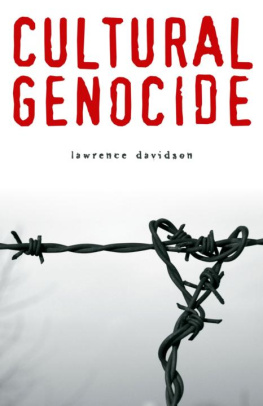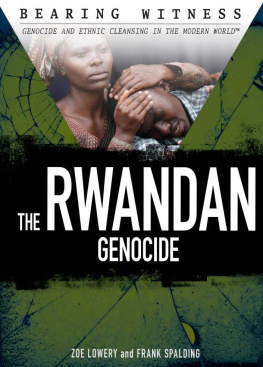
What Is Genocide?
Second Edition
Martin Shaw
polity
Copyright Martin Shaw 2015
The right of Martin Shaw to be identified as Author of this Work has been asserted in accordance with the UK Copyright, Designs and Patents Act 1988.
First published in 2015 by Polity Press
Polity Press
65 Bridge Street
Cambridge CB2 1UR, UK
Polity Press
350 Main Street
Malden, MA 02148, USA
All rights reserved. Except for the quotation of short passages for the purpose of criticism and review, no part of this publication may be reproduced, stored in a retrieval system, or transmitted, in any form or by any means, electronic, mechanical, photocopying, recording or otherwise, without the prior permission of the publisher.
ISBN-13: 978-0-7456-8710-0
A catalogue record for this book is available from the British Library.
Library of Congress Cataloging-in-Publication Data
Shaw, Martin, 1947
What is genocide? / Martin Shaw. -- Second edition.
pages cm
ISBN 978-0-7456-8706-3 (hardback : alk. paper) -- ISBN 978-0-7456-8707-0 (pbk. : alk. paper) 1. Genocide. I. Title. HV6322.7.S53 2015
304.663--dc23
2014035492
The publisher has used its best endeavours to ensure that the URLs for external websites referred to in this book are correct and active at the time of going to press. However, the publisher has no responsibility for the websites and can make no guarantee that a site will remain live or that the content is or will remain appropriate.
Every effort has been made to trace all copyright holders, but if any have been inadvertently overlooked the publisher will be pleased to include any necessary credits in any subsequent reprint or edition.
For further information on Polity, visit our website: politybooks.com
Contents
Boxes
Tables
Guide
Pages
PREFACE TO THE SECOND EDITION
Many people could probably give an answer to the question, What is genocide?, and name one or two cases maybe the Holocaust and Rwanda to which the term applies. They might assume that if a clear definition is required, a dictionary will answer the question in a few lines. The idea that a whole book could be devoted to this question, rather than to the history and politics of the problem, might seem surprising. Yet if we go beyond a few obvious and well-publicized cases, the scope of genocide is not immediately clear: even scholars do not agree on what should count. The popular idea of genocide, which equates it with mass killing, begs a lot of questions, was not what the originator of the idea meant by it and is not how most academics or the United Nations Genocide Convention define it. Yet people who study the question disagree profoundly among themselves about the answer, and people who use the idea in political life often choose the meaning that suits their cause, rather than a coherent idea. Genocide is a highly contested concept, politically as well as intellectually. So when the first edition of What is Genocide? was published a decade ago, it found a ready readership.
I have not changed my answer to the question, so it may well be asked why a new edition was necessary. One answer is that the book left some issues underdeveloped, and the rapid growth of the literature has made these more compelling. In particular, recent work has involved much fuller examination of the ideas of Raphael Lemkin, which stand at the heart of this book. The effect is that the discussion of Lemkin in the first edition is insufficient. While I indicated some problems with his approach, I did not explore these in the depth which now seems necessary and (because of new research) possible. I have therefore expanded the treatment of Lemkin to a full chapter. Two other key contributions which are particularly relevant to my argument, Leo Kupers idea of genocidal massacres and Tony Bartas idea of structural genocide, are also more fully treated.
A second reason for revising the book was to make my idea of structural analysis clearer, and in particular to amplify a key distinction between the structure of genocide itself, on the one hand, and the larger structural contexts in which genocide occurs, on the other. I have rewritten what are now also highlights the idea of the hybridity of genocide and war, implicit in the first edition, but which I only made explicit in an article in the Journal of Genocide Research after it was published.
Finally, although the book was complimented on its clarity, I felt that its organization and presentation could be improved so as to make it more accessible, especially for new students of genocide. So I have simplified the introduction and conclusion, highlighted illustrative material and presented my new definitions as the conclusion to the volume. I have also removed some discussions, for example about the role of civilians in war and the Nazification of the social sciences in Germany, which were tangential to the argument.
I have several debts apart from the many which will be obvious from the text. In preparing the original edition, my then Sussex colleagues, John Holmwood and William Outhwaite, gave valuable advice on reading in areas where my sociology was rusty. In preparing the new edition, Dirk Moses provided typically pertinent comments on an early draft of (on Lemkin), and Politys two anonymous reviewers made very helpful comments on the book as a whole. The United Kingdoms Economic and Social Research Council granted me the Research Fellowship in 2004 and 2005, which originally enabled me to write this book, as well as to finish The New Western Way of War, which discusses violence against civilians in a different context, and I remain very grateful to it.
I hope this new edition will explain the issues involved in the idea of genocide more effectively to new readers, while still offering considerable interest to those who were acquainted with the original work. As usual, I alone am responsible for the views expressed.
Martin Shaw
Devon, 2014
INTRODUCTION: THE IMPORTANCE OF DEFINITION
This book addresses the question: how should we understand the idea of genocide? Genocide has been a central issue of world politics several times in recent decades, especially in Bosnia, Rwanda and Darfur. Its history has also been a topic of controversy, in countries like Germany, Japan and Turkey over murderous violence in the two world wars, and in North America and Australia over earlier violence against indigenous peoples. The spectres of the Holocaust and the Nakba stalk twenty-first-century conflicts between Israelis and Palestinians. Genocide issues continue to arise in all too many current conflicts where populations are targeted with violence. Allegations of genocide are widely made and, invariably, disputed. All too often, genocide becomes a tool in political controversy, claimed by one side and denied by the other. Whenever new challenges arise, the same confused debate occurs over whether attacks on civilians constitute genocide, ethnic cleansing or just the excesses of a dirty civil war, often as though similar arguments had not already raged in earlier cases. Few ideas are as important in public debate, but in few cases are the meaning and scope of a key idea less clearly agreed.
It might seem axiomatic that scholarship should assist in the clarification of genocide, and thus help all those who feel that the idea assists them to understand terrible episodes of human history. Yet to many, definitional discussion over horrendous experiences of violence can seem beside the point. On this subject, normal academic assumptions cannot be taken for granted. The Auschwitz survivor Charlotte Delbo speaks of useless knowledge, when she refers to experiences that were so dark as to be unforgettable but also so overpowering that the more one encounters their stark realities even in reading about them, let alone in the flesh or in personal memory the more likely we are to be disoriented and overwhelmed by them. Here scholars must bear witness, show solidarity with victims and stand unequivocally on one side of the historical process.
Next page
